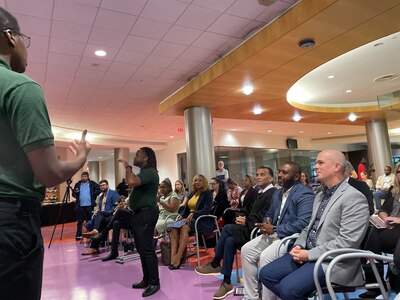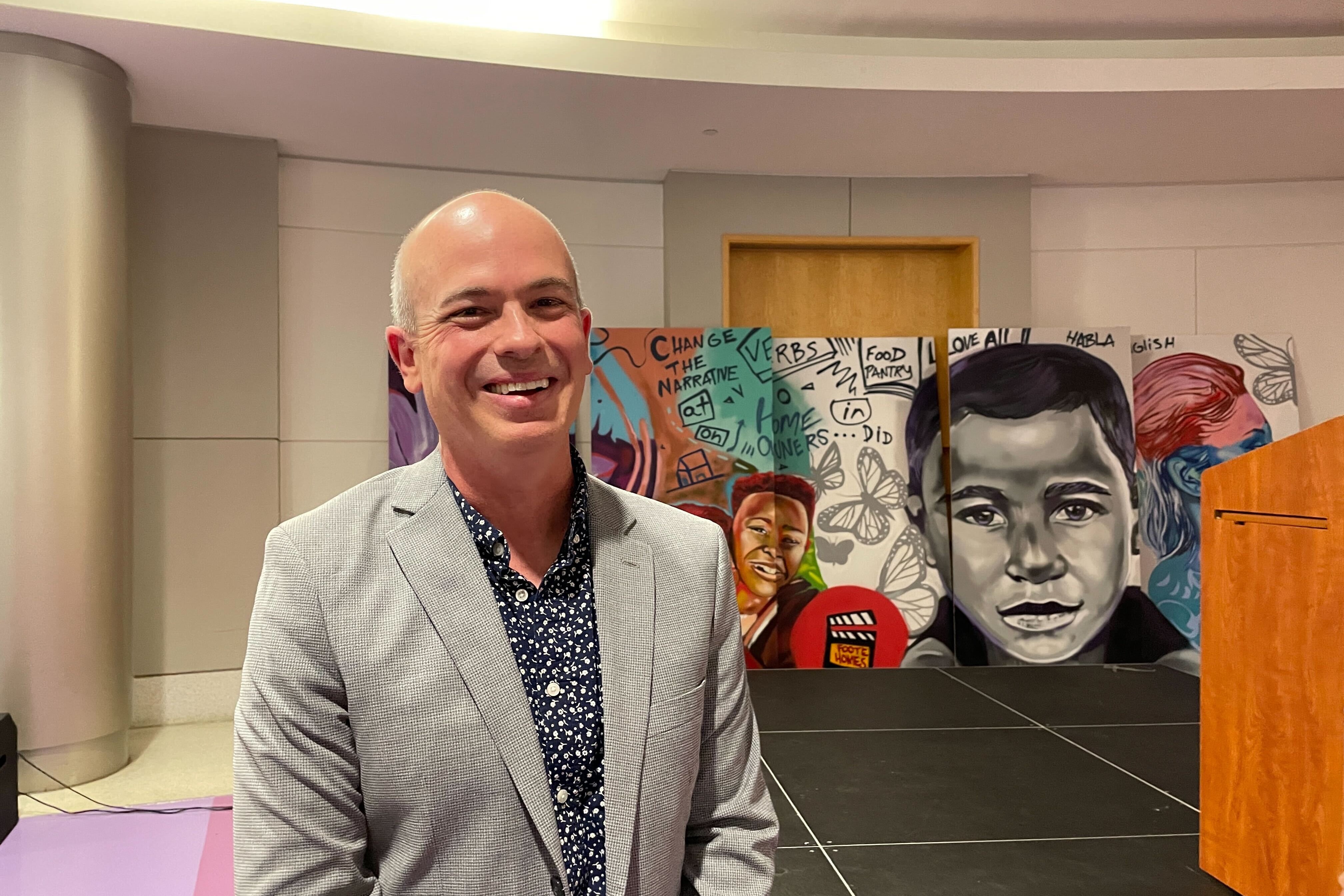Sign up for Chalkbeat Tennessee’s free daily newsletter to keep up with Memphis-Shelby County Schools and statewide education policy.
Mauricio Calvo, the newest member of the Memphis-Shelby County Schools board, took his oath of office next to the children’s section of a public library, with the county’s juvenile court judge swearing him in.
This was purposeful, Calvo had explained. The ceremony was meant to represent his passions and priorities: literacy and juvenile justice, as well as workforce readiness and Latino students.
Calvo, a longtime Memphian and CEO of the advocacy group Latino Memphis, was appointed to the board to serve the remainder of Sheleah Harris’ term in District 5, representing students and families in Cordova.
“I’m taking this appointment with a big sense of urgency,” said Calvo.
The Memphis school board has not had a Latino member in recent history, and Calvo, a Mexican-American who became a U.S. citizen in 2018, believes he may be the first Latino in local public office. His presence on the board could be welcome representation for the families of thousands of Latino students who make up 18% of the district.
Calvo ran unsuccessfully for a City Council seat in 2019, and ran for school board in 2020, before dropping out to endorse Harris. Last year, he served on one of the committees that helped develop the state’s new school funding formula, known as Tennessee Investment in Student Achievement, or TISA.
As an appointed school board member, Calvo has just a year remaining in his term — he hasn’t decided whether he’ll pursue election next summer — but it’s poised to be a big year. The board is trying again to select a new superintendent, after its last attempt soured and Harris abruptly resigned.
Beyond that, the district faces persistent challenges with academic performance, a slow recovery from the pandemic, and relations with a state government that has pushed a strongly conservative education agenda.
Calvo talked to Chalkbeat about how he plans to guide the district through these challenges.
This interview has been edited for length and clarity.
You are, at least in recent history, the first Latinx person in this position on the school board. What do you hope your colleagues learn from you in this year?
As far as I am concerned, yes, I am the first Latinx person I think in public office in Shelby County. I don’t think the Shelby County Commission, the Memphis City Council, or the school board ever had anybody. And I say this with a sense of, yeah, pride, but also humbleness and responsibility, because I do feel the pressure, in a good way. Some of that may be self-imposed. It could also be a little bit of impostor syndrome. It does come with a responsibility, because when you’re the first, you certainly don’t want to be, shouldn’t be, the last, or the only one. So that’s big.
“I think that matters in representation, particularly in a community that for so long, has been very Black and white.”
I’m also part of the LGBTQ community, and I’m open about that. I’m Mexican-American. I have an accent. I wasn’t born here. I am an American citizen now. I think there are a lot of intersectionalities. I think that matters in representation, particularly in a community that for so long, has been very Black and white. So it is disruptive in a positive way.
You were on the TISA subcommittee for ESL students. There’s quite a bit of funding for students who are English language learners. How do you, from your board seat, plan to evaluate how the board is spending funds toward those programs and toward resources, and whether or not they are working?
This is something very important. And although I keep saying that I represent everybody, obviously, I will have a special emphasis on English language learners.
When I sat on that committee, I actually made some public comments that it was disappointing. The whole process was complex. It felt very scripted. It felt that they had already arrived to decisions when they were asking us. I think at the end of the day, it’s better than what we had before — there’s more funding. But just funding alone is not going to do it. We need to make sure that the district is utilizing this extra money the right way.

I would say that for this and for everything else we need, we need to get away from the “We have always done it this way.” I’m very much going to be looking (for), as a characteristic of the superintendent, somebody who’s very open to innovation, to benchmarking what is happening in other districts, because, you know, when we think about that, it is not only supporting the students that are English language learners. It’s also supporting their families.
But I think I saw there’s about 12,300 English language learners in the district. So I’m curious to see, what else are we doing? Are we just doing the bare minimum? Are we deploying enough resources to the schools with larger numbers?
Perhaps my soft spot is how we’re serving recent arrivals that are more challenging to fit into grade level. So you may have a child from Guatemala who’s 12 or 13, and he’s really too old to put in elementary school, but really if you just put him in middle school, they’re going to be completely lost.
I know we have a newcomer center. But I’m curious to see how well we’re doing with that.
The application for MSCS superintendent has been posted for Round 2. Sheleah Harris, your predecessor, was very publicly a critic of the process. What should your constituents know about how you plan to help the board navigate this process, and what you feel your role will be?
I would love to have a conversation with the search firm. I’m not familiar with the scope of this search team, if they’re just going to say, “Hey, here’s a group of people,” are they actually going to help us filter them? At what point do they stop and say, “Here’s the list,” versus really selecting? Do we have somebody coaching us, advising us how to select this?
I spoke with a member in the City Council, and he told me, “I believe that selecting this superintendent is as important, if not more important than selecting the next mayor.” And I think he’s right on. We cannot take this lightly, and we need to know what we are doing.
From crime, to economic development, to housing, to homelessness to nutrition — we have the future of Memphis on our hands. And we are asking this person to set the vision, to create a plan, to get the staff (for) 110,000 customers every day. If somebody doesn’t believe or doesn’t understand that, they really need to have a check-in with themselves.
It is time to stop saying them and us, private and public, you know, this or that, or Black or white. The superintendent is going to have to be somebody that can rally a ton of people. And we as a board have a humongous responsibility getting this right. I want to go to bed knowing that I did absolutely everything I could to help bring this person here, and then select the person, support that person, hold the person accountable. That is our main job.
I do have experience, because I’ve served on a number of boards, locally and nationally. But I am also not shy. I can check my ego at the door, and say, “We need help.”
You’ve obviously worked with state officials before in different capacities, even on TISA. How have you thought about how you will be able to advocate for Memphis with people who aren’t from here at the state legislature?
I do recognize that importance of the relationship with Nashville. I think having Rep. (Mark) White chair the education committee is key, because he understands Memphis. But we have — I have said this before, and I will say again — we have a legislature that, in general, does not like Memphis. But we are going to continue to build relationships.
I do plan to use any experience that I have in visiting Nashville and building relationships with people, because where Memphis goes, it’s going to be important for the future of Tennessee.
I’m very committed to building a relationship with the County Commission, with the City Council — not necessarily to say that they need to be funding (MSCS), because they probably don’t have the money. But that doesn’t mean that they cannot do anything for us.
There’s a Latina (as) the new (Tennessee) secretary of education. I haven’t had a chance to meet her. From what I have read, she’s probably more conservative than I would probably have liked.
“... we have a legislature that, in general, does not like Memphis. But we are going to continue to build relationships.”
I know education is important for the governor, and for the previous governor. I think we should advocate for districts to have the flexibility that they need, because not all districts are equal — ours being not only the largest, but probably the most diverse. But we have our own challenges. And as such, we deserve our own say. These are our taxes: people in Shelby County paying taxes, sending them to the state and then coming back. For the most part, we are paying for our education, and we have the right to have a strong voice on how we want that shaped.
How, as a leader, do you determine the leading challenges and evaluate how the district and how the city, the county are responding to them? How are you going to evaluate and prioritize?
I think we have to flip the narrative. Instead of having the district being blamed for everything, I think the district needs to say, “Hey, we’re big boys here. We have $2 billion. We have 200 schools. We have 110,000 children. We’re the second largest employer. What are we doing about all of these things?” That doesn’t mean that we have to solve all of those things. But it certainly means that our hands need to be, in some way or capacity, in a lot of those things.
It may not be the position, my responsibility, to tackle all of this, but I’m not the only board member. There are nine of us. And also there are 14,000 employees.
We need to embrace this role as a big, humongous player in the city.
I think the district works really well with some partners, and other partners either haven’t had a good experience or haven’t heard from the district in a long time. We need to be in all of these conversations, and also other people need to join us on this work. Because we can no longer just blame the district for everything.
There’s an expectation for example, from FedEx to sponsor things, to be here, to do this. People want the Grizzlies and St. Jude and FedEx to do well. People in general, whether you have kids or not in the public system, people should have a positive perspective about us.
How do we change the narrative and say, now the Grizzlies and St. Jude and FedEx don’t have to solve all the problems, but they are touching the problems, and we need to do the same. But we don’t need to do it alone. I need and we need people to join us on this work.
In closing, I want to say the opportunity is there. Yes, the challenge is also there. That’s why I’m doing this.
Laura Testino covers Memphis-Shelby County Schools for Chalkbeat Tennessee. Reach Laura at LTestino@chalkbeat.org.






